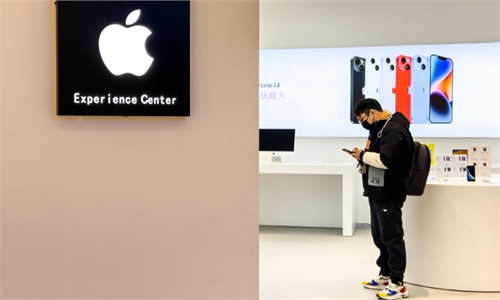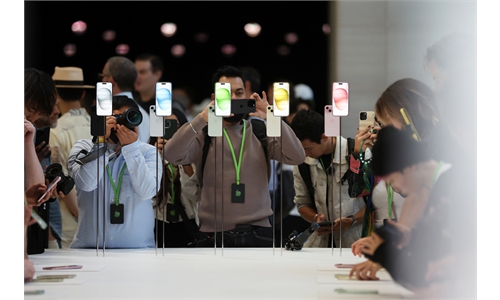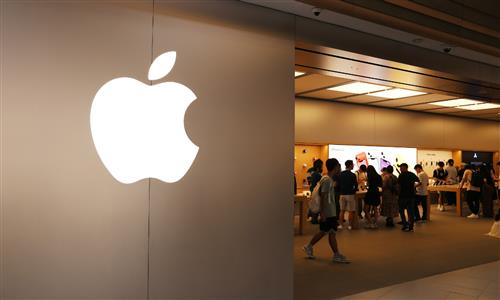
Illustration: Chen Xia/Global Times
"Nihao, Chengdu! This stunning image of the historic Anshun Bridge is captured on iPhone 15 Pro Max," Apple CEO Tim Cook wrote on Monday in both Chinese and English on his social media account on Sina Weibo, trying to use his personal influence to promote Apple's new iPhone 15 series. As reported, Cook has made a surprise visit to China in recent days, amid news that sales of the iPhone15 series were below expectations around the world.Sales for the iPhone 15 are down 4.5 percent in China compared with iPhone 14 sales in the first two weeks after its launch, CNN reported on Monday, citing statistics from Counterpoint Research. As China serves as a key market for iPhones, its sales decline has drawn widespread attention, with some Western observers attributing its underperformance to tensions in China-US ties and "sluggish consumer demand" in China, which is a groundless and biased claim.
Sluggish sales of Apple's new iPhone 15 series can be attributed to its own problems, as it lacks groundbreaking innovations, while at the same time the California-based tech giant is facing increasingly intense competition from Chinese competitors such as Huawei, especially after the launch of the Mate 60 Pro.
Compared with previous models, Apple's new iPhone 15 series have new chips and new titanium shells and come with a USB-C charging cable. Although Apple spent a lot of time talking at its iPhone 15 launch event about the features of its products that use artificial intelligence, consumers don't perceive any truly groundbreaking updates. Some said that the company has lost its innovative edge, and is relying on its brand influence and customer loyalty to sell the new iPhone series.
Apple's sales for the fiscal third quarter that ended on July 1 fell 1.4 percent to $81.8 billion. For the April-June period, iPhone sales of $39.7 billion was a 2.4 percent year-on-year drop. Apple's difficulties are increasingly visible not only in China but around the world.
Criticizing China for China-US tensions instigated by Washington, as well as economic challenges that have been exaggerated by the West, cannot help Apple find the true cause for its global sales decline.
Of course, Apple faces special pressure in China, not from geopolitics but from Huawei. According to a report from Jefferies analysts, Huawei has overtaken Apple's iPhone as the smartphone market share leader in China, thanks to the launch of its Mate 60 Pro smartphone, which has a chip that appears to support 5G.
Although Huawei has kept a low profile about the chip it used, many believe the surprise launch highlights the firm's moment of rebirth. Chinese consumers have voted with their wallets, offering rewards to companies focusing more on innovative breakthroughs. This is a result of market choice, rather than geopolitical factors.
In the face of Western sanctions, Huawei's innovative capabilities are surprising and also admirable. It is likely that with its Mate 60 series, Huawei could recapture some market share from Apple in both the Chinese and global markets, which will pose a challenge to the US tech giant.
There are challenges ahead for Apple, but it's no use to view its sluggish sales through a geopolitical lens, or use them as a tool to smear the Chinese economy. Certainly, there is increasingly intense competition between Chinese and US companies, but Chinese officials have repeatedly stressed that China will always welcome foreign companies, including US firms, to invest and operate in China.
Wang Yong, vice chairman of the 14th National Committee of the Chinese People's Political Consultative Conference, said recently that China will unswervingly promote high-standard opening-up. Wang stressed that China would further improve the environment for foreign investment.
In an open business ecosystem, US companies operating in China are indeed facing increasing competitive pressure. How can they cope with competition? At the very least, Western public opinion should stop hyping geopolitical confrontations, and stop seeing normal business competition through a geopolitical lens. American companies should invest more in innovation and compete fairly with Chinese companies.
The author is a reporter with the Global Times. bizopinion@globaltimes.com.cn



